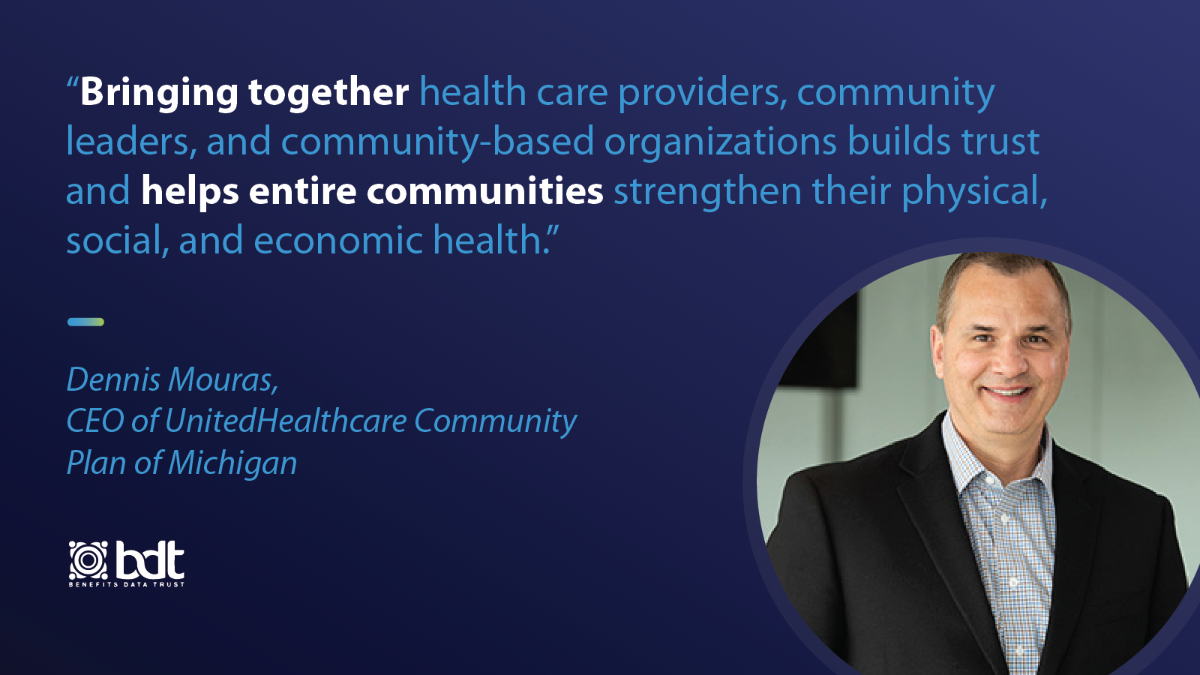
Benefits Data Trust (BDT) and UnitedHealthcare Community Plan of Michigan are collaborating to help Medicaid plan members better access the Supplemental Nutrition Assistance Program (SNAP), a critical benefit linked with improved current and long-term health.
While Medicaid participants are often eligible to receive SNAP benefits, many do not participate because of a lack of awareness, transportation challenges, limited technology skills and access, and other barriers. The new initiative between BDT and UnitedHealthcare seeks to increase the number of UnitedHealthcare Community Plan of Michigan members enrolled in SNAP by providing additional education and support.
In April, UnitedHealthcare community health workers and case managers began directly transferring members to BDT’s Michigan Benefits Center. If a member is identified as needing additional food support through a routine Social Drivers of Health (SDOH) screening, the UnitedHealthcare team member offers a referral to the Michigan Benefits Center for comprehensive SNAP application assistance. Once the client’s call is transferred, BDT Benefits Outreach Specialists provide additional education about SNAP, conduct eligibility screening, and submit applications on their behalf if a member qualifies for the program.
Below Dennis Mouras, chief executive officer of UnitedHealthcare Community Plan of Michigan, discuss the partnership, what it means for Medicaid members, and the organization’s commitment to the communities it serves.
Q. What is UnitedHealthcare’s strategy for addressing food security among low-income individuals?
UnitedHealthcare has developed core service lines and capabilities designed to address social determinants holistically. Our goal is to improve access to, and delivery of, community resources that are the gateway to overall well-being and ultimately impact health outcomes.
To launch solutions, we rely on data-driven strategies specific to the local needs of communities we serve.
In 2021, as part of our local commitment to addressing food insecurity in the communities we serve in Michigan, we gave a $270,000 grant to Gleaners Community Food Bank to expand the unique School Food Mobile Pantry Program and to create a “Playbook” for developing long-term, successful relationships with school districts to reach out to food-insecure families and provide healthy food and nutritional education with the goal of increasing educational success. We also gave Forgotten Harvest $223,000 to expand the Forgotten Harvest mobile pantry program in metro Detroit.
Q. How did UnitedHealthcare determine that access to food benefits should be included as a key strategy to help your members?
According to the American Journal of Preventive Medicine, nearly 80% of what influences a person’s health relates to nonmedical issues, such as food, housing, transportation, and the financial means to pay for basic daily needs.
Social and economic factors have a profound impact on achieving and maintaining good health.
Therefore, many states now require or encourage managed care organizations to screen for social issues and provide referrals to services.
By focusing on delivering whole-person care, we can deliver more than just health care, including SDOH-related services and supports. Not only does this comprehensive approach improve health outcomes, but it also reduces costs.
Q. Why is it important for different sectors, such as healthcare and nonprofits, to come together to tackle food insecurity? How is this approach innovative?
UnitedHealthcare collaborates with local organizations and decision-makers to better understand and address the barriers impacting individuals in the communities we serve. Bringing together health care providers, community leaders, and community-based organizations builds trust and helps entire communities strengthen their physical, social, and economic health. This collaborative approach helps to maximize limited resources and efficiently address existing gaps, ultimately enabling more individuals to engage in their health.
We are committed to expanding capacity for organizations working on the frontlines to ensure critical supports and services are accessible.
The partnership with BDT creates an innovative opportunity to further health equity as we assist our members in getting the immediate support they need, while also increasing health literacy as we empower individuals to better navigate the process in the future to ensure they can take advantage of all resources available to help them live healthier lives.
Q. What was a deciding factor when choosing a partner to help UnitedHealthcare address food insecurity? How did you learn about/why did you decide to collaborate with BDT?
The SNAP application process often requires a significant amount of time and resources – this can sometimes deter individuals who need SNAP the most from applying for or taking advantage of the benefit. BDT has successfully assisted with SNAP applications and education in other states, and we hope to leverage their experience to expand this support throughout Michigan.
Q. When thinking about this partnership, what does success look like?
Ultimately, our goal is to increase awareness, access, and utilization of SNAP benefits, and if this partnership helps increase engagement with our members that may not have known about the benefit or were unable to apply on their own then that is a success.
To learn more about UnitedHealthcare Community & State programs and partnerships across the country, visit www.uhccommunityandstate.com.
